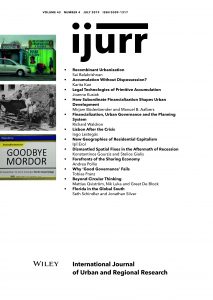The sharing economy, often phrased as ‘platform capitalism’, enables firms such as Uber and Airbnb to monetize, through specific technologies of mediation, the networks, the assets and the precarious labour of those who are described as ‘the entrepreneurs of sharing’. This article explores the urban geographies of ride‐sharing in the marketization of Uber in Cape Town, South Africa. I use empirical evidence collected during the first phase of its operations in the city, between 2013 and 2015, to show how Uber relied upon the developmental entrepreneurialism of Cape Town to embed its ride‐sharing market locally, and how the drivers enacted multiple technical, economic and ethical regimes within and without the constraints of the software platform. The research presented in this article thus contributes to understanding how the discourses of millennial development, with its promises of entrepreneurial empowerment, are adopted by global sharing‐economy firms to enact their markets in the global South. It also reveals how a different genealogy of Uber’s urban transactions offers an alternative perspective on the normative rationalities of the sharing economy and on the diverse economies that exist in relation to platform capitalism in the global South.

